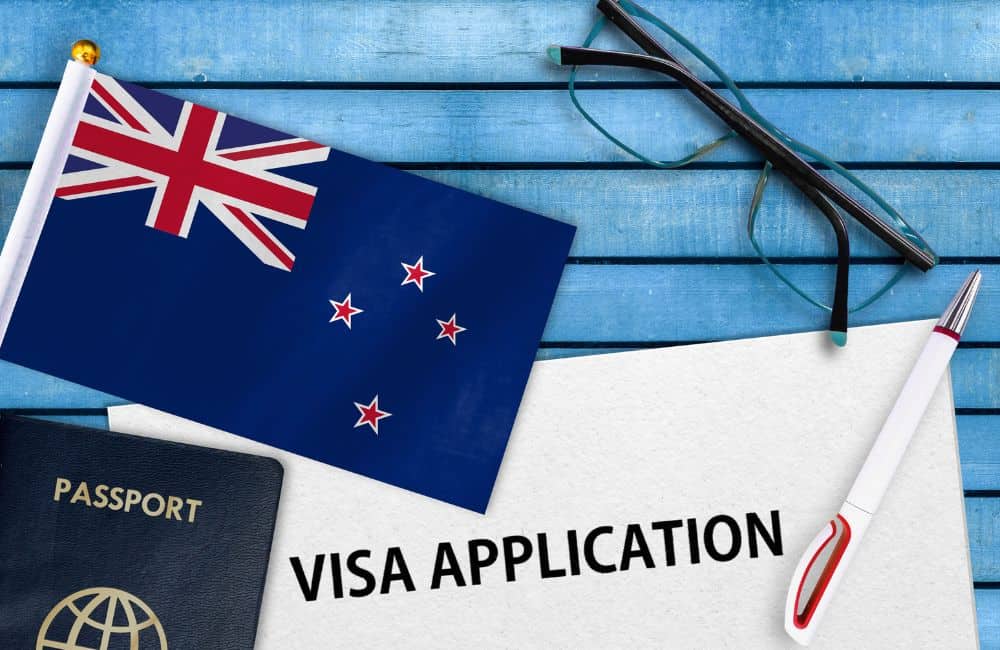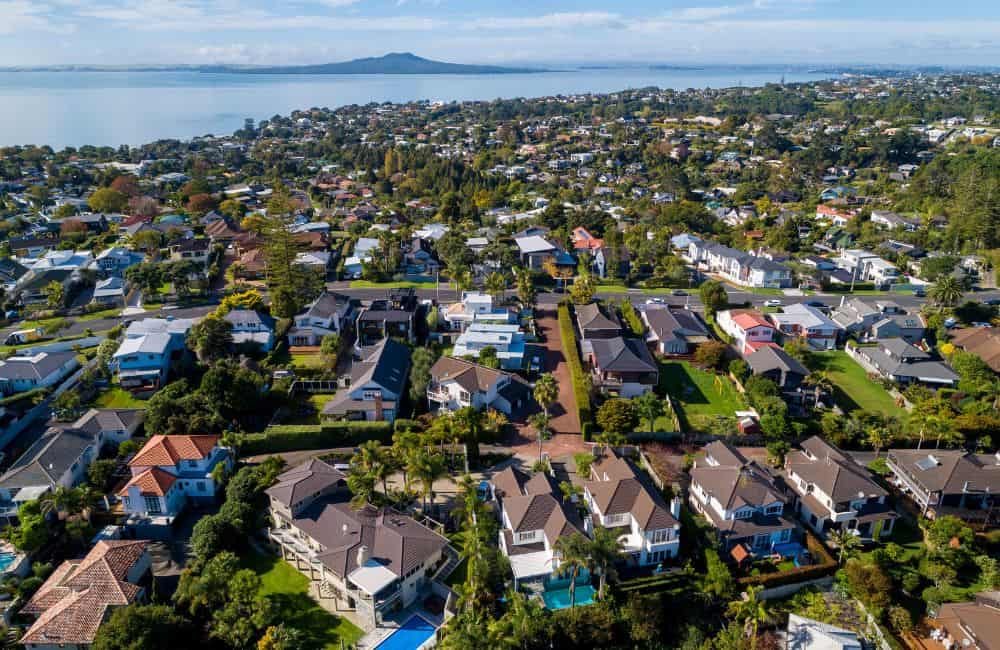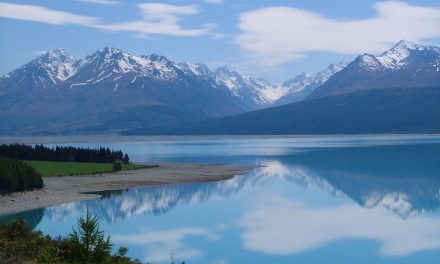Thinking of moving to New Zealand? Our ultimate guide details everything you need to know about moving permanently, including requirements, visa options, jobs where to live, and moving your personal belongings.
Have you ever dreamt of starting a new life in a breathtakingly beautiful country that offers a high quality of life, a fantastic work-life balance, and endless growth opportunities? If so, look no further than moving to New Zealand.
This post will guide you through the essential aspects of moving to this incredible country, covering everything from visa options to finding employment, housing, healthcare, education, and the cost of living. Let’s embark on this exciting journey to your new home!
Key takeaways
- Move to New Zealand for a beautiful, balanced lifestyle with exciting opportunities.
- Find employment in the thriving job market and enjoy affordable housing options.
- Take advantage of top healthcare and education systems while exploring unique cultures & traditions.
- Record numbers of people are moving to New Zealand but you need to have the right visa so it is worth seeking expert advice.
Contents
- 1. Moving to New Zealand – Interesting Statistics
- 2. Reasons to Move to New Zealand
- 3. Visa Options for Moving to New Zealand
- 4. Finding Employment in New Zealand
- 5. Housing and Accommodation
- 6. Healthcare System in New Zealand
- 7. Education System in New Zealand
- 8. Cost of Living in New Zealand
- 9. Adjusting to Life in New Zealand
- 10. Best places to live in New Zealand
- 11. Currency Transfer
- 12. Shipping and Importing Personal Belongings to New Zealand
- 13. Taxes and Financial Considerations
- 14. Moving to New Zealand with Your Pet
- Are you looking to move to New Zealand?
- Frequently Asked Questions
- Can a UK citizen move to New Zealand?
- How much money do I need to move to New Zealand?
- Is it worth moving to New Zealand from UK?
- What are some popular outdoor activities in New Zealand?
- How does the cost of living in New Zealand compare to the UK?
- Do I need a Migration Agent to help me apply for a visa to New Zealand?
- Would you like information on jobs and visas if you’re moving to New Zealand?
FREE Online Shipping Cost Calculator for New Zealand
1. Moving to New Zealand – Interesting Statistics
- UK citizens are the largest group of migrants with 272,436 living in New Zealand (2019 census).
- Following the end of the Covid pandemic 2023 saw a record number of people moving to New Zealand with 237,100 migrant arrivals in the year ending September 2023.
- The most popular nationalities moving to New Zealand were India (44,600), Philippines (33,800), China (28,500), Fiji (10,100), South Africa (9,400) and Australia (6,800)
- 6300 UK citizens moved to New Zealand in 2023.
- In addition, 26,400 New Zealand citizens returned home.
Would you like information on job vacancies and visas if you’re moving to New Zealand? Click Here
2. Reasons to Move to New Zealand
Imagine living in a country where jaw-dropping natural beauty, outstanding quality of life, and a great emphasis on work-life balance are the norm. That’s what life is like for British citizens, especially British expats in New Zealand.
With a population of around 60 million less than the UK, this thriving nation offers an array of exciting opportunities for those who choose to call it home and settle in Zealand permanently. There are so many great reasons to move to New Zealand. We just highlight a few of them below.
Incredible natural beauty
New Zealand is a land of awe-inspiring landscapes, with dramatic mountains, pristine beaches, and lush rainforests at every turn. No matter where you find yourself, you’ll be surrounded by nature’s splendour, which greatly enhances the quality of life. This breath-taking scenery provides endless opportunities for outdoor activities, such as:
- Mountain biking
- Hunting
- Fishing
- Hiking
- Enjoying the beautiful beaches
Moreover, Wellington, the capital city, boasts over 100 parks and playgrounds, perfect for a refreshing escape from the urban hustle.
High quality of life
New Zealand consistently ranks high in global quality of life surveys, thanks to its strong focus on community, safety, and well-being. Factors such as:
- Social support
- Income
- Health
- Freedom
- Generosity
- Lack of corruption
contribute to the excellent quality of life in the country. Furthermore, New Zealand highly values equality and has a virtually non-existent class system.
Registering your child’s birth in the country is also a simple process, allowing you to easily obtain a local birth certificate for your little one.
Work-life balance
The Kiwi lifestyle is all about striking a healthy balance between work and leisure. Besides ample vacation time, the work environment in New Zealand is typically more relaxed than in the UK. This emphasis on work-life balance allows for more time to engage in various outdoor activities, such as walking, jogging, swimming, and going to the gym. New Zealand is also the birthplace of several thrilling sports, like bungy jumping, Zorbing, and cycling, as well as exciting inventions like fly by wire and jet boating.
Football is becoming increasingly popular in the country. It’s a five-a-side indoor version of the sport.
3. Visa Options for Moving to New Zealand
To make your dream of living in New Zealand a reality, you’ll need to navigate the various visa options available. Whether you’re looking for:
- Work
- Pursuing your studies
- Joining family members
- Launching a business
There’s a temporary visa that’s perfect for your needs.
The upcoming sections provide a detailed overview of various visa options to assist in your decision-making process.
Would you like information on job vacancies and visas if you’re moving to New Zealand? Click Here
Work visas
New Zealand offers a range of work visas to suit different skill sets and job types, with some targeting specific industries facing skill shortages. Accredited Employer Work Visa, for example, allows individuals with a full-time job offer to stay in the country for up to 5 years. To qualify for this visa, applicants must meet a minimum skill threshold and showcase relevant skills and work experience.
Additionally, the country has an official critical skill shortage list (Green List), which can help you identify occupations in high demand, making it easier to secure employment and obtain a visa. The Green List is a list of skill shortage occupations that lead directly to residence either straight to residence or work to residence pathways, dependant on your occupation and Green List requirements.
Alternatively, there is another skilled employment pathway points based system under the Skilled Migrant Category where you can claim points for specific skill areas such as income, registration, qualifications and New Zealand based work experience.
Family visas
If you’re looking to join a loved one in New Zealand, family visas are an excellent option. These visas allow family members of New Zealand residents or eligible visa holders to join them in the country. Family visas are available for:
- Children
- Partners
- Parents
- Grandparents
These New Zealand visa options cater to various family situations and provide a way for families to be together in New Zealand.
For example, the Parent Retirement Resident Visa allows parents of adult children who have New Zealand citizenship or are residents to obtain a permanent residence visa, provided they meet specific financial requirements related to their New Zealand citizenship.
Student visas
For those looking to pursue their studies in New Zealand, student visas offer a fantastic opportunity to experience the country’s renowned educational institutions. To study full-time for more than 3 months, you’ll need a Fee Paying Student Visa, which requires enrolling in a course with an approved education provider and paying the associated costs.
With this visa, you can study in New Zealand for up to 4 years and even work part-time to support yourself during your studies.
Business visas
Entrepreneurs and investors looking to contribute to New Zealand’s economy can explore various business visa options. The Investor 1 Visa, for instance, grants residency to those who invest a minimum of NZ$10 million for 3 years, while the Entrepreneur Work Visa requires a minimum investment of NZ$100,000 and the demonstration of a viable business plan. These visas not only provide an opportunity to grow your business but also allow you to enjoy the benefits of living in New Zealand.
Working Holiday Visa
A unique opportunity for young people between the ages of 18 and 30 (35 for UK citizens), the Working Holiday Visa allows you to:
- Work and travel in New Zealand for up to 12 months for most countries but 36 months for UK citizens!
- Explore the country
- Immerse yourself in the local culture
- Gain valuable work experience
You cannot stay permanently or get a permanent job offer on the Working Holiday Visa but it is a great starting point to get a taste of life as a Kiwi.
4. Finding Employment in New Zealand
New Zealand has a thriving job market, with many UK citizens finding rewarding careers. Boosting your success chances involves researching high-demand industries, comprehending average salaries, and implementing effective job hunt strategies.
If you are looking for a job in New Zealand, then complete our form below and we’ll put you in touch with employers who actively recruiting people from overseas.
In-demand industries
Certain industries in New Zealand, such as healthcare, IT, and engineering, face skill shortages and are in high demand for qualified workers. Professionals in these sectors may have an easier time securing employment and obtaining a visa.
Furthermore, leveraging the country’s critical skill shortage list can assist in pinpointing high-demand occupations, enhancing the likelihood of securing a job that aligns with your expertise. You can view our full list of most in demand jobs in New Zealand to see if your skills are needed.
Average salaries
Salaries in New Zealand are generally higher than in the UK, with variations depending on the industry and location. Some industries, such as:
- Construction
- Design and architecture
- IT
- Marketing
- Healthcare
offer higher average salaries than others. Nonetheless, harmonizing salary expectations with the cost of living is vital, given the variable living expenses across urban and rural areas.
Job search tips
To find a job in New Zealand, consider the following strategies:
- Networking: Attend industry events and engage with professionals in your field. Utilize online platforms like LinkedIn to connect with potential employers and expand your network.
- Online job portals: Websites like Seek, TradeMe, and MyJobSpace provide job listings in various industries. Regularly check these portals for new job opportunities.
- Recruitment agencies: Register with recruitment agencies that specialize in your field. They can help match you with suitable job openings and provide guidance throughout the application process.
By utilizing these strategies and familiarizing yourself with the Zealand Qualifications Authority, you can increase your chances of finding employment in New Zealand.
Additionally, recruitment agencies like Beyond Recruitment, RecruitNZ, Adecco, Advanced Personnel, and CC Recruitment can match you with suitable job opportunities.
Finding A Job Before You Arrive In New Zealand
Securing employment in New Zealand prior to your arrival can greatly ease your transition. We are in contact with a variety of New Zealand employers who are actively seeking to fill vacancies with skilled individuals from the UK.
By completing the form below, we can connect you directly with these employers at no cost. This service streamlines your job search, offering you a head start in securing a suitable position that matches your skills and experience, thereby smoothing your move to New Zealand.
Would you like information on job vacancies and visas if you’re moving to New Zealand? Click Here
5. Housing and Accommodation
Once you’ve secured a job and visa, the next step is to find a place to call home in New Zealand. Housing options in the country include purchasing property, renting, and finding temporary accommodation upon arrival.
This section provides an in-depth look at the diverse facets of housing and accommodation in New Zealand.
Property prices
Property prices in New Zealand can be higher than in the UK, particularly in major cities like Auckland and Wellington. However, now could be a good time to buy as the downturn which started in 2021 seems over with prices beginning to rise in autumn 2023.
Average prices in 2023 are NZ$1,015,000 (£492,000) in Auckland and NZ$782,000 (£379,000) in Wellington but can be much cheaper elsewhere. For example NZ$661,000 (£320,000) in Canterbury and as low as NZ$390,000 (£189,000) on the West Coast.
Additionally, property prices in suburbs, smaller towns, and rural areas are more affordable, providing more options for potential homeowners. Check here to get an idea of what home you can afford to buy in New Zealand.
Rental costs
Rental costs in New Zealand vary depending on location, with urban areas generally being more expensive than rural regions. For example, the median price for a 3-4 bedroom property in Auckland in 2023 is NZ$650 (£315) per week, NZ$510 (£247) in Canterbury and Otago, while rural areas can offer even lower rental prices.
Investigating rental markets in preferred locations is necessary to locate a suitable and budget-friendly home.
Finding a home
Locating the ideal home in New Zealand requires neighbourhood research, interaction with real estate agents, and personal property visits. Websites like OneRoof.co.nz, Realestate.co.nz, TradeMe.co.nz, and Homes.co.nz can help you find listings, while real estate agents can provide expert advice and guidance throughout the home-buying process.
Visiting properties allows you to explore the location, size, condition, and features of the home, as well as get a feel for the surrounding area, such as the neighbourhood, schools, and amenities.
6. Healthcare System in New Zealand
New Zealand’s healthcare system offers high-quality, publicly-funded services for citizens, residents, and some visa holders, ensuring that everyone has access to essential healthcare services.
Upon moving to New Zealand, expatriates will find a public healthcare system that provides most medical services free of charge, including hospitalisation, emergency care, and maternity services.
For non-resident migrants, it’s important to note that eligibility for public healthcare depends on the type of visa and duration of stay. Those not eligible for the public system or seeking more immediate or specialised care often opt for private healthcare, which can be accessed through private insurance.
This blend of public and private healthcare systems in New Zealand not only promises high-quality medical services but also offers a degree of flexibility, allowing individuals to choose the care that best suits their needs and circumstances.
7. Education System in New Zealand
For individuals relocating from the UK to New Zealand, the transition to the local education system should be relatively seamless, as it bears many resemblances to the British system. New Zealand’s education system is celebrated for its high standards and is segmented into three tiers: primary, intermediate, and secondary (high school).
Children typically start primary school at the age of 5 and continue until around 12 years old. This is succeeded by two years of intermediate schooling. Secondary education, extending to approximately age 19, culminates in the National Certificate of Educational Achievement (NCEA), a credential recognised for university entry.
A distinctive feature of the system is its comprehensive approach to education, which emphasises not only academic learning but also personal growth, critical thinking, and outdoor education. The country provides a variety of public and private schooling options, with state schools being free for permanent residents.
Once you have an idea of where you will be moving to, it’s a good idea to start the process of finding a school in New Zealand.
8. Cost of Living in New Zealand
The cost of living in New Zealand, when compared to the UK, presents a nuanced picture, particularly when factoring in the generally higher average wages in New Zealand. While the cost of certain essentials like housing, groceries, and utilities can be relatively higher in New Zealand, these are often offset by higher average salaries.
For instance, housing in major cities like Auckland and Wellington can be more expensive than in many UK cities, but the overall income levels tend to be higher, which helps in balancing out these costs. Similarly, while day-to-day expenses such as food and transportation might seem steep at first glance, they are usually manageable with the average local income.
It’s also worth noting that New Zealand offers a quality of life that is considered high, with access to natural beauty, outdoor activities, and a generally less hectic lifestyle, which can be a significant factor for many. However, those relocating should be prepared for certain expenses that might be higher than in the UK, such as healthcare for non-residents and certain consumer goods, due to geographical isolation.
Overall, while the cost of living in New Zealand can be higher in some areas, the higher average wages and lifestyle benefits often provide a compensatory balance for those moving from the UK.
9. Adjusting to Life in New Zealand
Adjusting to life in New Zealand for newcomers, particularly those from the UK, is generally a positive experience, marked by the welcoming nature of its people and the laid-back lifestyle. The cultural shift can be mild, with English as the common language and a shared love for sports and outdoor activities.
However, expats may need to adapt to a more relaxed pace of life, often described as ‘Kiwi time’, which is less hurried than in many Western countries. The breath-taking landscapes encourage a strong outdoor culture, inviting new residents to engage in hiking, water sports, and other outdoor pursuits. Socially, Kiwis are known for their friendliness and inclusiveness, making it easier to build new connections.
It’s also important to be open to the local customs and Maori culture, which holds significant importance in New Zealand society.
10. Best places to live in New Zealand
The main cities to live in New Zealand are Wellington and Auckland. Both cities are equipped with contemporary amenities, encompassing diverse cultural sites, a variety of dining options, and dynamic nightlife.
Wellington, the nation’s capital, is celebrated for its artistic vibe and cool ambiance, making it a magnet for creative individuals. Its climate is notably more temperate than Auckland’s, offering expatriates a year-round comfortable living environment.
Auckland, surpassing Wellington in size, is renowned for its cosmopolitan and energetic character, reflecting a blend of various cultures. Additionally, it stands out as one of New Zealand’s sunniest cities, boasting an impressive average of 2,000 hours of sunshine each year.
For those considering relocation within New Zealand, other appealing choices include Christchurch, Hamilton, and Tauranga. Our comprehensive guide for best places to live in New Zealand delves into the foremost cities, highlighting their unique attributes and advantages.
11. Currency Transfer
When moving substantial funds overseas, obtaining a quote from a specialised international currency exchange service is important. Such services often offer more competitive rates and lower fees compared to regular banks, which can lead to substantial savings. These savings are particularly important when relocating abroad, as the costs associated with moving can be considerable.
You can find a reliable international currency company here.
12. Shipping and Importing Personal Belongings to New Zealand
Embarking on a new adventure in New Zealand is exciting, but before immersing yourself in its stunning landscapes and vibrant culture, there’s the important task of moving your belongings. Relocating from the UK to New Zealand requires careful planning, especially regarding removals and shipping your belongings. Selecting a reliable international removal company that is well-versed in safely and efficiently transporting items to New Zealand is crucial.
It’s important to be mindful of New Zealand’s customs regulations, potential biosecurity checks, and any related fees, as the country has strict rules to protect its unique ecosystem. Remember, shipping times can vary, with sea freight often taking 8 to 12 weeks, so starting this process early, decluttering, and prioritizing essential items is advisable. This preparation will help ensure a smooth transition, allowing you to begin your new life with your treasured belongings safely in New Zealand.
PSS International Removals are experts in removals and shipping to New Zealand from the UK. Whether you’re moving an entire household with a vehicle or simply sending a few boxes, we can assist. For more information, visit our guide on removals to New Zealand, or use our free online cost calculator for an initial estimate.
13. Taxes and Financial Considerations
Understanding the tax system and financial aspects is essential for UK expats moving to New Zealand. The tax system is straightforward, with progressive income tax rates. Notably, New Zealand doesn’t impose inheritance or general capital gains taxes, except in specific property dealings.
Expats should be aware of their tax responsibilities in both the UK and New Zealand. If you stay in New Zealand for over 183 days in a 12-month period, you may become a tax resident, taxed on global income, necessitating professional financial advice.
The Goods and Services Tax (GST) in New Zealand is a 15% value-added tax on most goods and services, similar to the UK’s VAT, and is usually included in displayed prices.
Setting up a local bank account for daily transactions is advisable. For those considering pension transfers, it’s important to understand the tax implications and regulations around transferring UK pensions to New Zealand.
Finally, prepare for the cost of living differences between the UK and New Zealand, balancing higher wages with potentially higher expenses for some essentials, and plan your budget accordingly.
14. Moving to New Zealand with Your Pet
Taking your pet to New Zealand involves navigating strict biosecurity laws to protect its unique environment. Your pet will need to meet health requirements like vaccinations and, in some cases, blood tests, with possible quarantine upon arrival. Starting this process well in advance of your move is essential.
Choosing a pet transport company experienced with New Zealand’s regulations is highly recommended. They can streamline the process, ensuring a safe and smooth journey for your pet to New Zealand.
Are you looking to move to New Zealand?
Relocating to New Zealand presents an extraordinary chance for a new beginning in a land known for its breath-taking landscapes, exceptional quality of life, and an enviable work-life balance. By familiarising yourself with the key elements of the move, including visa requirements, job opportunities, housing, healthcare, education, and understanding the cost of living, you are setting yourself up for a successful transition to life in this remarkable country.
To ensure your journey to New Zealand is as smooth as possible, we invite you to explore our comprehensive guide on removals to New Zealand. This resource provides invaluable information and tips to help you plan your relocation effectively.
Additionally, don’t miss the opportunity to receive free advice on visa options tailored to your specific circumstances. Completing the form below will not only give you access to expert guidance on navigating New Zealand’s visa process but also keep you informed about current job vacancies specifically for people from the UK. This is your chance to connect with potential employers and find a role that suits your skills and aspirations in New Zealand.
Are you ready to embark on this thrilling adventure and embrace everything that New Zealand has to offer? Begin your journey today by taking the first step: fill out the form below for tailored advice and job opportunities. Welcome to the start of your exciting new chapter in New Zealand!
Frequently Asked Questions
Can a UK citizen move to New Zealand?
British citizens have the opportunity to move to New Zealand by applying for a suitable visa, with various types available for both temporary and residence purposes. The New Zealand government provides guidance on working in New Zealand, along with how to apply for the necessary visa and an IRD number.
How much money do I need to move to New Zealand?
You need around £5,000-£10,000 to move to New Zealand from the UK on a budget, depending on your individual circumstances. Single flights cost around £600 and shipping belongings can cost anything from £500 for a few boxes to £7,000+ for a large house. With some planning and careful budgeting, you can make this transition with ease!
Is it worth moving to New Zealand from UK?
Moving to New Zealand from the UK promises a much higher standard of living with significantly higher wages and more disposable income. It’s definitely worth considering if you’re looking for a change of scenery.
What are some popular outdoor activities in New Zealand?
Exploring the great outdoors is a popular pastime in New Zealand, with activities like mountain biking, hunting, fishing, and hiking, as well as enjoying the beautiful beaches.
How does the cost of living in New Zealand compare to the UK?
Overall, the cost of living in New Zealand is comparable to the UK – some items may be more expensive, but it is still an affordable place to live.
Do I need a Migration Agent to help me apply for a visa to New Zealand?
Choosing a migration agent when applying for a visa for a permanent move to New Zealand is a prudent decision due to the complexity and ever-changing nature of immigration laws and regulations.
Migration agents are well-versed in the intricacies of the visa application process, ensuring that all documentation is accurately completed, reducing the likelihood of delays or rejections. They can provide invaluable guidance tailored to an individual’s specific circumstances, navigate potential pitfalls, and streamline the overall process, making the transition to New Zealand smoother and more efficient.
Would you like information on jobs and visas if you’re moving to New Zealand?
Please complete the form below…











